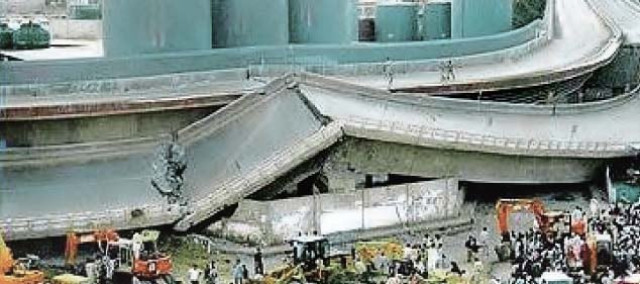Ex-chairman, GM construction granted interim bail
Families of victims in Shershah bridge debacle say they are still awaiting justice.

Javed and Barakzai, the co-accused in the Shershah bridge collapse case, fled from court on Saturday after Additional District and Sessions Judge Gulshan Ara Chandio rejected the interim charge sheet and ordered the arrest of all the accused in the case — who were on interim bail then.
Consequently, the three accused present in court, including NHA chairman Choudhry Altaf, Najamul Hasan and Khalid Mirza of the project’s consultant company Engineering Consultants International Limited (ECIL) were taken into custody.
On Monday, advocate Shaukat Hayat, representing the accused, submitted that there is no direct evidence available against his clients. He also spoke about the 31 month delay in nominating the accused. He also referred to the interim charge sheet submitted by second investigator DIG Iftikhar Tarar that absolved them. No prosecution witness has implicated the accused, their counsel submitted.
Referring to Barakzai’s role, Hayat submitted that he was neither associated with the bridge’s design, construction or consultancy. Meanwhile, Javed only signed the agreements with ECIL and National Logistics Cell, he submitted.
The bench admitted the accused to interim bail till November 23.
The Additional District and Sessions Judge Chandio had on Saturday held that the police supported the accused during reinvestigations, while in the earlier charge sheet and investigation, the police had found evidence against the under-trial accused.
The first investigation was ordered by the then prime minister Shaukat Aziz while the reinvestigation was ordered by Capital City Police Officer (CCPO) Karachi after Choudhry Altaf moved an application, alleging that the Investigation Officer had falsely implicated them due to pressure from government officials.
The CCPO, granting the application, ordered that a senior officer — not below the rank of an SSP — shall reinvestigate the matter. DIG Iftikhar Hussain Tarar then investigated the case and on the previous hearing, absolved the accused of charges as “no cogent evidence was available against them”.
‘We need justice’
Zain, Hasnain and Maryam are still traumatised. Their grandfather, Ghulam Ali, takes them to the grave of their father, Rizwan Raza, every Sunday.
Thirty-one-year old Rizwan was one of the five people who died in the Shershah bridge collapse. On September 1, 2007, a part of the then newly-constructed Northern Bypass bridge in Shershah collapsed, barely a month after its inauguration by former president Pervez Musharraf on August 6, 2007. Fourteen people were injured and six cars were destroyed in the collapse of a section of the one-kilometre-long bridge. A sharp curve in the faulty design was said to be the reason for the collapse.
A case had been registered against the suspects at the Supreme Court’s orders. But families of those who were killed in the incident are still waiting for justice.
Kazim Raza, Rizwan’s brother, told The Express Tribune that the incident had scarred the children. “They have still not forgotten the tragic death of their father.”
“We had faced the worst of all,” Kazim said. First, they got one half of Raza’s body, that too, 18 hours after the bridge collapsed. “We got the other half 10 days later.”
The bridge’s construction and reconstruction had cost billions of rupees but what they offered the aggrieved families was nothing, he said.
He hoped that the Chief Justice of Pakistan would take suo motu action and ensure that the families receive the Rs1.5 million promised to them by the authorities.
“The National Highway Authority (NHA) chairman had promised in a meeting that NHA would fund the education of the victims’ children but that was not done either.”
Ali Muhammad, son of Noor Muhammad, also lost his life in the fatal collapse. He is survived by his wife, one son and a daughter.
According to Muhammad’s brother-in-law, Usman, those who are responsible for the tragedy easily manage to flee from the court, while those who suffered are completely ignored. The authorities had sanctioned Rs1.5 million in compensation, but only one-eighth of the money was given to Muhammad’s widow. The remaining sum was deposited which the children can use only after they turn 18, Usman explained. “Compensation money was not enough to claim that justice was done. The responsible people should be imprisoned.”
Salma’s husband, Fayyaz, was also killed in the incident. She has two sons and four daughters. According to Fayyaz’s brother, two of Salma’s daughters have reached their marriageable age but she does not have money to finance their weddings.
“I work in a private company and earn only Rs6,000 per month. I am the only one supporting the family after my brother’s death.” he said. “Can the government tell me how can eight people survive on just Rs6,000?”
He also criticised the decision to deposit the money, which the children cannot spend until the age of 18. “What will we do until then? Do they not understand that we need food every day?”
Published in The Express Tribune, November 9th, 2010.



















COMMENTS
Comments are moderated and generally will be posted if they are on-topic and not abusive.
For more information, please see our Comments FAQ